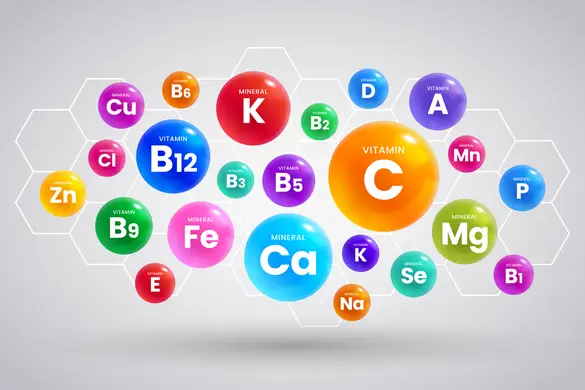Multi-Vitamins Uses, Side Effects & Warnings

Multi-Vitamins Uses, Side Effects & Warnings
Posted on 15th Apr, 2023
It is essential to consume a well-balanced diet that includes a variety of foods that can provide the body with all the necessary vitamins and minerals. However, sometimes people are not able to consume a balanced diet, or certain medical conditions may affect the absorption or utilization of essential nutrients. In such cases, multivitamins are a viable supplement that can assist to fill in nutrient gaps and prevent deficiencies.
Multivitamins can contain a range of vitamins, including vitamins A, C, D, E, K, and B-complex vitamins (such as thiamine, riboflavin, niacin, B6, B12, and folic acid), as well as minerals such as calcium, iron, magnesium, zinc, and selenium. Different multivitamins may contain different amounts and combinations of these vitamins and minerals.
Uses of Multivitamins
Help prevent nutrient deficiencies: Multivitamins can be used to help prevent deficiencies of essential vitamins and minerals, particularly in people who have a poor diet, limited food choices, or certain medical conditions that interfere with nutrient absorption.
Support overall health and wellness: Multivitamins may provide a range of health benefits, such as boosting immunity, promoting healthy hair, skin, and nails, improving energy levels, and supporting brain function.
Specific needs: Certain population groups, such as pregnant and lactating women, children, and older adults, may have increased nutrient needs that may be difficult to meet through diet alone. In such cases, multivitamins may be recommended by healthcare professionals.
Side Effects
While multivitamins are generally safe for most people, they can cause side effects in some individuals. Some of the common side effects of multivitamins include:
Upset stomach: Taking multivitamins on an empty stomach or in large doses can cause digestive discomfort such as nausea, vomiting, and diarrhea.
Allergic reactions: Some people may be allergic to certain vitamins or minerals in multivitamins, which can cause itching, swelling, and difficulty breathing. If you experience these symptoms after taking a multivitamin, stop taking it immediately and seek medical attention.
Vitamin toxicity: Taking too many multivitamins can lead to vitamin toxicity, which can cause symptoms such as fatigue, nausea, and vomiting. This is more likely to occur when taking supplements that contain fat-soluble vitamins, such as vitamins A, D, E, and K, which can accumulate in the body over time.
Interactions with medications: Multivitamins can interact with certain medications, including blood thinners, antibiotics, and diuretics, among others. These interactions can reduce the effectiveness of the medication or increase the risk of side effects.
Warnings
Multivitamins should not be used as a substitute for a healthy diet: While multivitamins can help fill in nutrient gaps, they are not a replacement for a balanced diet rich in whole foods.
Certain medical conditions may require special consideration: People with certain medical conditions, such as kidney disease or liver disease, may need to avoid or limit certain vitamins or minerals in multivitamins.
Interactions with other medications: Some medications can interact with multivitamins, either reducing their effectiveness or increasing the risk of side effects. It is important to talk to a healthcare provider before taking multivitamins if you are taking any medications.
Dosage: It is essential to take multivitamins in the recommended dosage. Taking too much of certain vitamins or minerals can cause adverse effects.
Forms of Multivitamins:
Multivitamins can come in various forms, including tablets, capsules, softgels, gummies, liquids, powders, and chewables. The form of the multivitamin can affect how well it is absorbed and tolerated by the body. For example, some people may find it easier to swallow a small capsule or tablet, while others may prefer gummies or liquids that are easier to chew or drink. It is important to choose a form of multivitamin that works best for you and to follow the recommended dosage and usage instructions provided on the label or by a healthcare professional.
Conclusion:
It is essential to note that multivitamins are not a one-size-fits-all solution, and some people may require different combinations or doses of vitamins and minerals based on their individual needs. Therefore, it is always important to consult a healthcare professional before starting any supplement regimen, including multivitamins.

Health articles from our experts

Top 10 Vitamin B12 Supplements

Vitamin B12 से भरपूर 8 फल

10 Best Biotin Supplements, According To a Dietitian

Is Biotin Good for Hair?

Multivitamins: The All-in-One Solution for Optimal Nutrition and Vibrant Living

Multivitamins for Hair, Skin, and Nail Health: Enhancing Your Natural Beauty

The Power of Vitamin C: Benefits for Immunity, Skin, and Overall Health

Vitamin ABCs: Understanding the Basics of Essential Vitamins

The Right Way To Get Vitamin D From Sun In India

